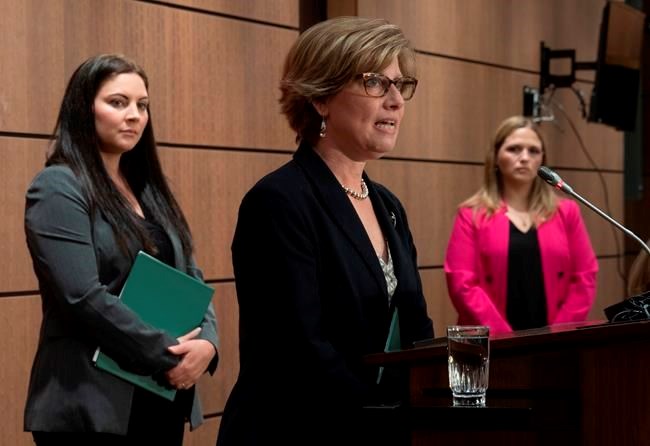OTTAWA — An Ontario centre that helps women and girls who have been victims of human trafficking and sexual exploitation has to shut one of its key support programs next month due to a federal fund that has expired, even as the COVID-19 pandemic continues.
Megan Walker, executive director of the London Abused Women's Centre, says she is devastated at the prospect of closing this program and fears for the safety of those it serves.
"To have to go and speak with these women and girls and let them know they may no longer be able to come here for service leads them back to only one person, and that's their trafficker," Walker said.
"If we turn our backs on these women and girls now, they will be hopeless. They have already reported that if they can't be served, they'll be suicidal and they may be killed."
The London centre is one of 13 organizations across Canada whose federal funding ended on March 31 due to end of a five-year federal program set up by the former Conservative government alongside efforts to reform Canada's prostitution laws.
The Measures to Address Prostitution Initiatives (MAPI) program is being replaced by a new national strategy to combat human trafficking. But even though the Liberals announced $75 million in funding for this strategy in September 2019, none of this money has materialized.
This has left a gap in funding for some of the organizations that operated under the previous program, with no clear idea of when new money will be made available.
Community members rallied to raise funds to keep the London centre operating fully until the end of June, but Walker says she doesn't know what will happen after that.
"We're in a pretty desperate situation at the moment."
On Thursday, members of Parliament from every opposition party joined together to call on the Liberal government to reverse its decision to allow the former funding to expire.
Conservative MP Karen Vecchio, Bloc Quebecois MP Andreanne Larouche, Lindsay Mathyssen from the NDP and Green MP Jenica Atwin sent a joint letter to Prime Minister Justin Trudeau and other ministers responsible for this file, calling on them to restore funding to these groups and enable them to continue their work.
The letter was also signed by every opposition member of the Commons status of women committee and the MPs with organizations in their ridings affected by the funding change.
"These programs are vital, these programs save lives, these programs give people a second chance and these programs are working to end human trafficking and sexual exploitation," Vecchio said.
Mathyssen said the situation highlights concerns that women's organizations have repeatedly raised about the vulnerability that exists when groups are reliant on project-based funding.
"Organizations are left to scramble and scrape together the funding to deliver programs that they know are essential," Mathyssen said.
"The federal government needs to get back to providing core, stable, reliable funding to women's organizations so they can deliver these needed services, especially when there's an emergency or something unexpected that comes up that they need to deal with. They can move funding to best fit what is needed by their community."
Mary-Liz Power, spokeswoman for Public Safety Minister Bill Blair, says money will flow from the new national strategy soon, although no timelines were offered.
"Backed by $75 million in additional investments, the national strategy to combat human trafficking will increase Canada's ability to fight this abhorrent attack on basic human rights and dignity," Power said in a statement. She pointed to other funding commitments the Liberal government has made to help women's organizations and reduce gender-based violence.
Four of the 13 organizations that received funding under the MAPI program in the previous fiscal year are now receiving funds through another stream of the Justice Department's victims' fund, according to Justice Minister David Lametti's press secretary, Rachel Rappaport.
Walker expressed frustration at ongoing promises from government officials who say they're working on finding a solution.
"If your government truly has a feminist agenda that prioritizes the most vulnerable women and girls in society, what are you working at? Why don't they just say, 'Yes this was an error and here's the money?' It's very, very confusing for us."
This report by The Canadian Press was first published May 28, 2020.
Teresa Wright, The Canadian Press

